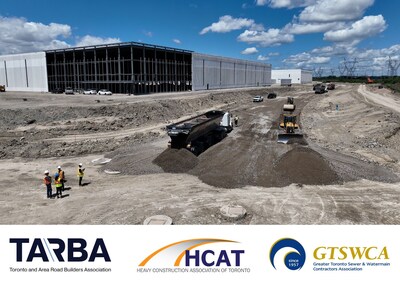TORONTO, May 13, 2025 /CNW/ – The civil infrastructure construction associations welcomed the Ontario government’s announcement that consultations will be launched with municipalities and industry to harmonize road building standards as part of the recently introduced Bill 17, Protect Ontario by Building Faster and Smarter Act, 2025.

Ontario’s municipalities own and manage more public infrastructure than the federal and provincial governments combined, with, on average, more than 50 per cent of their budgets allocated to construction and infrastructure. While provincial standards exist, Ontario’s 444 municipalities have discretion in their implementation and have instead amassed hundreds of varying requirements for how to build and procure similar use projects, like roads, bridges, sewers and watermains. These differences cost taxpayers millions of dollars more, while reducing quality and productivity and increasing waste and carbon emissions.
The Toronto and Area Road Builders Association (TARBA), Greater Toronto Sewer and Watermain Contractors Association (GTSWCA), and the Heavy Construction Association of Toronto (HCAT) have advocated that following provincial standards, jointly administered by the Ontario Ministry of Transportation and the Municipal Engineers Association, will result in reduced building costs and faster construction timelines through efficiencies and economies of scale.
“This announcement builds on the government’s ongoing commitment to reduce red tape and build the critical infrastructure our communities need. We look forward to working with the provincial government and the ministry as part of the consultation process,” said Raly Chakarova, Executive Director at TARBA. “Breaking down barriers by harmonizing practices across municipal boundaries is a real solution that will bring in faster construction timelines and create significant cost savings for taxpayers, particularly through initiatives such as the standardized and increased use of Recycled Crushed Aggregates.”
“This is a pivotal moment for infrastructure development in Ontario,” said Patrick McManus, Executive Director of the GTSWCA. “By standardizing construction specifications and contracts, we can reign in rising construction costs and lay the groundwork for sustainable growth and cost-effective infrastructure solutions, without fundamentally altering how we design, build, finance, or maintain our critical core infrastructure in the region.”
“This is the time for the provincial and federal governments to step in and ensure that municipalities have predictable and continuous infrastructure funding to get projects out the door, shovels in the ground, and keep everyone employed,” said Peter Smith, Executive Director at HCAT. “But municipalities need to drop their own barriers. There is no reason that a different asphalt type or watermain fitting needs to be used simply because a project crosses over Steeles Ave.”
About GTSWCA
The Greater Toronto Sewer and Watermain Contractors Association (GTSWCA) serves as a collective voice for its members who build water, wastewater, and stormwater infrastructure across the Greater Toronto Area. www.oswca.org
About HCAT
The Heavy Construction Association of Toronto (HCAT) represents contractors in the heavy civil engineering construction sector, including bridge construction and rehabilitation, tunnels, marine construction, and structure foundations. HCAT advocates for best practices in infrastructure development while addressing industry challenges, providing educational opportunities, and promoting safety and sustainability. www.hcat.ca
About TARBA
The Toronto and Area Road Builders Association (TARBA) is the collective bargaining agent on behalf of unionized contractors involved in the new construction and maintenance of transportation infrastructure in the Greater Toronto and Simcoe Areas. TARBA advocates for policies and practices that promote safe, efficient, and sustainable infrastructure development. www.tarba.org
SOURCE Toronto and Area Road Builders Association (TARBA)

The post Civil Construction Industry Welcomes Provincial Commitment to Standardize Municipal Construction Practices appeared first on The Malaysian Reserve.
